As we look toward 2025, the industrial engineer salary in Philippines is anticipated to experience notable growth, driven by both economic development and the increasing demand for efficiency in various sectors. With the rise of automation and digital transformation, companies seek skilled industrial engineers to streamline operations and enhance productivity. This expanding job market is expected to lead to higher salary offers, particularly for those with specialized data analysis, supply chain management, and process optimization skills. As industries evolve and adapt to new technologies, the value of industrial engineers is likely to rise, reflecting positively on their compensation packages.
Several factors will influence the industrial engineer salary in Philippines in the coming years. Firstly, the level of education and experience will play a crucial role, as employers are more inclined to offer competitive salaries to candidates with advanced degrees and certifications. Additionally, the geographical location of job opportunities will impact earnings, with urban centers like Metro Manila generally offering higher salaries than rural areas. Moreover, the government and private sector investments in infrastructure and manufacturing will create more job openings, further driving up salary expectations. As a result, aspiring industrial engineers should focus on continuous learning and skill enhancement to capitalize on the promising salary trends projected for 2025.

1. Current Industrial Engineer Salary in Philippines
The average industrial engineer salary in Philippines is approximately PHP 19,095 per month, reflecting the current demand for skilled professionals in this field. Filipino industrial engineers are crucial in optimizing processes and improving efficiency within various sectors, including manufacturing, logistics, and service industries. This salary figure is a benchmark for aspiring industrial engineers entering the workforce, providing insights into expected earnings and helping guide career decisions.
The salary range for industrial engineers in the Philippines can vary significantly based on several factors. Experience is one of the most critical determinants; entry-level positions typically start lower, while seasoned professionals with specialized skills can earn considerably more. Additionally, the employment industry can affect compensation, with sectors like manufacturing and technology often offering higher salaries than others. Geographical location also plays a role, as urban areas with higher living costs, such as Metro Manila, tend to provide better salary packages than rural regions.
Several factors currently impact the industrial engineer salary in Philippines. Economic conditions like inflation and industry growth can influence salary adjustments and demand for Filipino industrial engineers. Furthermore, advancements in technology and the increasing emphasis on automation and efficiency are reshaping the roles of Filipino industrial engineers, potentially leading to higher salaries as businesses seek to improve competitiveness. The ongoing development of educational programs and training opportunities also plays a significant role in shaping the skill set of graduates, which can directly affect their earning potential in the job market.
2. Projected Trends for Industrial Engineer Salaries in 2025
As we look ahead to 2025, the industrial engineer salary in Philippines is projected to experience a steady increase of approximately 3% year on year. This growth trajectory is indicative of the broader trends within the engineering sector, where the demand for skilled professionals continues to rise. Factors such as the expansion of manufacturing industries, the push for efficiency in operations, and the integration of advanced technologies contribute to this upward trend. As companies increasingly prioritize process optimization, the need for Filipino industrial engineers who can design and implement efficient systems will remain critical, thereby boosting their market value.
One of the primary drivers of this projected increase in industrial engineer salaries is the consistent growth of various industries in the Philippines, particularly in manufacturing, logistics, and supply chain management. The government’s initiatives to promote industrialization and foreign investments have also created a favorable environment for job creation. Additionally, as businesses seek to adapt to dynamic market conditions and consumer demands, Filipino industrial engineers with specialized skills in data analytics, automation, and sustainable practices will be in high demand. This specialization not only enhances the value of these professionals but also justifies higher salary offerings.
Economic conditions play a significant role in shaping salary trends as well. As the Philippine economy recovers and grows, the overall employment landscape is expected to improve, typically leading to increased competition for skilled labor. This competitive environment will likely drive companies to offer more attractive compensation packages to secure top talent in industrial engineering. As such, the industrial engineer salary in the Philippines is set to rise, reflecting the convergence of industry growth, demand for specialized skills, and favorable economic conditions that characterize the coming years.
3. Strategies for Maximizing Industrial Engineer Earnings
To maximize the industrial engineer salary in Philippines, professionals in the field should focus on continuous learning and skill enhancement. Advanced knowledge in data analytics, process optimization, and lean manufacturing can significantly boost an engineer’s market value. Participating in workshops, webinars, and online courses related to the latest industrial engineering trends and technologies can help Filipino engineers stay updated and relevant in a competitive job market. Additionally, pursuing higher education, such as a master’s degree in industrial engineering or related fields, may open up opportunities for higher-level positions that generally offer better compensation.
Certifications are crucial to enhancing an industrial engineer’s salary in the Philippines. Obtaining industry-recognized certifications such as Six Sigma, Lean Certification, or Certified Manufacturing Engineer (CMfgE) can validate an engineer’s expertise and commitment to their profession. These credentials demonstrate a deep understanding of quality management and efficiency improvements and make candidates more attractive to potential employers. Companies often prioritize hiring individuals with certifications, as they are perceived to possess specialized knowledge that can contribute to the organization’s goals.
Networking and professional affiliations can also significantly impact an industrial engineer’s earning potential. Joining organizations like the Institute of Industrial Engineers (IIE) in the Philippines or participating in industry conferences helps professionals connect with peers and industry leaders, which can lead to job opportunities and career advancement. Additionally, engaging in mentorship programs can provide valuable insights and guidance on navigating the industry landscape effectively. By combining technical skills, certifications, and a robust professional network, Filipino industrial engineers can effectively enhance their earning potential and achieve a higher industrial engineer salary in the Philippines.
Endnote: 2024-2025 Industrial Engineer Salary in Philippines
As industrial engineering evolves in response to technological advancements and market demands, the landscape of the industrial engineer salary in Philippines is also changing. Professionals entering this field must know the various factors contributing to salary variations, including industry, experience, education, and geographic location. For instance, Filipino industrial engineers in high-demand sectors such as manufacturing, logistics, and healthcare often enjoy higher salary prospects than those in less lucrative industries. By staying updated on the latest salary trends and projections, aspiring Filipino industrial engineers can make informed decisions about their career paths and strive for positions that promise competitive compensation.
Moreover, effective career planning is essential for maximizing the potential of an industrial engineer salary in Philippines. Engaging in continuous professional development, pursuing advanced degrees or certifications, and gaining experience through internships or entry-level positions can significantly enhance an individual’s marketability. Networking with industry professionals and joining relevant associations also opens doors to new opportunities and insights into emerging trends. By proactively addressing these factors, industrial engineers can better position themselves for success in a dynamic job market, ensuring a rewarding career and a salary that reflects their skills and contributions to the industry.












